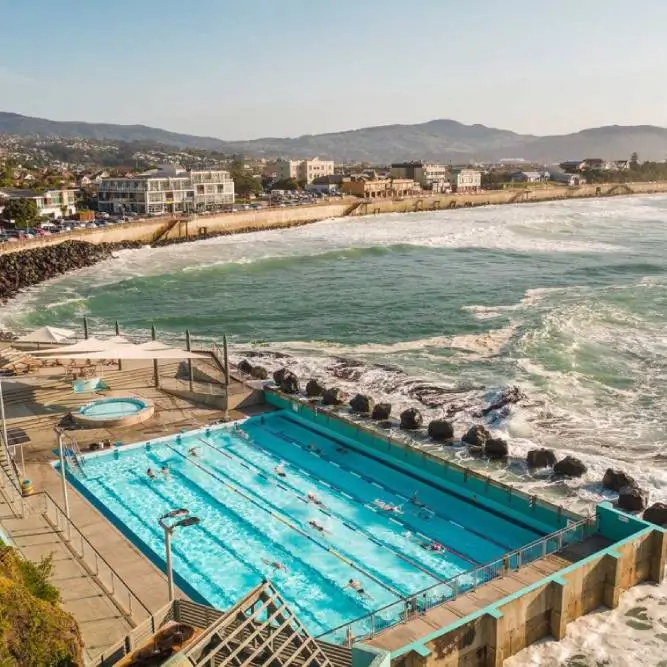
For more details fill out this form, we'll quickly get back to you
Study In New Zealand
One of the most popular locations for international education is the unique island of New Zealand with its beautiful and picturesque settings. It must be experienced in person to fully appreciate the harmonious and diverse study environment. More than 20,000 foreign students are currently enrolled in New Zealand's educational system at all levels, according to statistics.
For a variety of courses, from short-term, vocational courses to degree programmes, New Zealand provides outstanding education in a secure learning environment.
Since New Zealanders themselves like learning about other cultures, they quickly form strong bonds with tourists and international students.
The tourists quickly come to feel quite at home and completely at ease thanks to the wonderful hospitality shown to them.
All of the campuses meet international standards and have a welcoming yet serious atmosphere. There are state-of-the-art research facilities, libraries, and faculty, as well as a global collaborative knowledge exchange. Top graduates have been produced over time as a result, and new, helpful technologies have emerged.
Students come from many different places, including Europe, South East Asia, the UK, North Asia, Japan, South America, India, China, and Australia.

Why you should study in New Zealand
Given below are some of the reasons why you should study in New Zealand:
- Internationally recognized qualifications
- High education standards
- Wide range of general as well as specialist programs
- Appealing learning environment
- Studies along with recreation
- Pleasant climate
- New Zealand ranked as the most peaceful country in the world
One of the world's friendliest, most tranquil, and self-sufficient nations is New Zealand. In the field of education, universities are comparable to the majority of internationally renowned institutions. Once enrolled, the student can only anticipate a secure and respected standing in society, no matter where they live.
The environment for learning is well designed, and you receive top-notch instruction on top of the most recent technological advancements built into the system. You immediately feel welcomed and happy to be a part of New Zealand's educational system thanks to the diverse, multicultural, and energetic student body.
With its vast open areas and gorgeous flora, New Zealand's clean, orderly, and pure air invites you to join it. While away from home, you feel protected and can focus on your studies without feeling uneasy. It is simple to locate adequate lodging at reasonable prices. The people of New Zealand are warm and kind, and they quickly make you feel at home. The cost of living and tuition are very reasonable.
If you enjoy participating in outdoor sports, be sure to check out high-adrenaline activities like bungee jumping, trail biking, jet skiing, white-water rafting, heli-skiing, skiing, and snowboarding. You can engage in leisurely activities like golf, hiking through the wilderness, and scuba diving in marine reserves. Over 400 golf courses exist.
NEW ZEALAND STUDENT VISA REQUIREMENTS
The New Zealand student visa you require will depend on your course and how long you want to stay in the country. Having a valid passport and the right visa is crucial for a hassle-free entry.
It's vital to keep your status as a fee-paying student while you're studying in New Zealand. The reason you come to New Zealand is relevant to this status.
If you want to apply for New Zealand visa for Indian students or international students then you need to know the three types of students visa available in the country:

1. For a single course
You can pursue an approved programme of study for up to four years with a fee-paying student visa.
2. For several courses
With a Pathway Student Visa, you can take up to 3 courses consecutively for up to 5 years with a recognised provider, such as secondary schooling and then a bachelor's degree programme.
3. For your children if you are in NZ
Children (19 years old or under) of those in New Zealand on certain types of student or work visas are eligible for dependent child student visas.

Documents Required for Applying Student Visa in New Zealand
-
A passport that is currently valid and will remain so for at least three months following your visit to New Zealand.
-
An acceptance letter from a New Zealand-based educational institution that specifies the minimum course length, the total cost of tuition, and whether or not the tuition is payable in local or foreign currency. The New Zealand Qualifications Authority (NZQA) must accredit the course.
Additional Documents Required for Student Visa in New Zealand
- Academic training documents such as diplomas, transcripts, degrees or certificates
- New Zealand student visa application form
- Visa application fee
- A confirmation of payment for tuition fees
- Proof that you have adequate funds to cover your living expenses through the periods of your stay.
- You need to show that you have NZ $22,000 for a full year of study or
- NZ$1,250 per month if you are studying for less than three years. This may include:
- Bank statements
- Financial undertaking by a sponsor to cover living and accommodation expenses
- A scholarship program like New Zealand Aid Program Scholarship
- Proof that you are leaving New Zealand after your course completion (optional)
- A police certificate (evidence of good character) if you are aged 17+ years and plan to study for more than 2 years.
- An X-ray certificate - you will need to have a chest x-ray if you are staying in New Zealand for more than 6 months, or if you are a citizen of a country having high occurrence of tuberculosis, or if you have spent more than 3 months in the last five years in a country with a relatively high frequency of tuberculosis
- Full medical examination
For getting New Zealand Visa for Indian students and international students, the above-mentioned guidelines are to be met.
How the New Zealand education system works
In New Zealand, children typically begin school at age 5 and study in New Zealand for 13 years.
There are:
- Public schools, which are subsidised by the government.
- Kura kaupapa Māori schools, where at least 51% of the time, the curriculum is taught in the Māori language.
- Private schools, where tuition is paid by the parents.
Primary School Education
Depending on the school, students attend primary school from year 0 or 1 (age 5) through year 6 or year 8.
Children in years 7 and 8 who attend primary schools that do not extend to this level attend intermediate school.
The New Zealand Curriculum is the name of the elementary curriculum, and Te Marautanga o Aotearoa is the name of the Mori language version.


Secondary School Education
Year 9 (about 12-14 years old) through Year 13 are the years of secondary school (around 16-18 years old). Students often start level 1 in year 11 and progress through levels 1 through 3 in year 13 as they study toward the National Certificate of Educational Achievement (NCEA).
The first three levels of the New Zealand Qualifications Framework include NCEA levels 1, 2, and 3. (NZQF). Students pass the NZQF at each level by earning a certain number of credits.
University Entrance (UE), which is given to students who have earned NCEA Level 3 and have satisfied other requirements, is the bare minimum prerequisite to enrol in a New Zealand university or students with high achievement scores can get scholarships in New Zealand and get to study in best colleges in New Zealand.
Tertiary Education
In New Zealand, there are several ways to pursue tertiary education:
- Universities
- Wānanga
- Te Pukenga - the New Zealand Institute of Skills and Technology
- Private/government training establishments
- Workplace training

The New Zealand Qualifications Framework (NZQF)
All academic and vocational qualifications in New Zealand are governed by the New Zealand Qualifications Framework (NZQF).
Level 10 is the most complex of its ten levels, which are based on complexity. For accurate and up-to-date information on all quality-assured qualifications, from senior secondary school to doctoral degrees, consult the NZQF.
Acceptance of credentials from other nations
You can apply to NZQA for an assessment if you wish your credentials from other countries to be accepted in New Zealand.
Student Exchange Program
A student exchange is a once-in-a-lifetime opportunity during studies. It is an opportunity to totally ingratiate yourself in another culture. You will stay with a host family, go to a nearby school, engage with the neighbourhood, and perhaps even pick up a new language.
By organising placements, visas, flights, and insurance for high school students interested in international exchange programmes, Tutel provide knowledgeable help. Our thorough screening procedure makes sure that students have the abilities and traits required for a fruitful exchange. We take student safety extremely seriously, making sure to give them the best possible preparation before they go and provide them with ongoing support.
Frequently Asked Questions
To pursue Bachelor’s degree in New Zealand it would cost from 4,000 to 6,000 EUR/year
For Indian students, New Zealand is one of the best places to study and work. It provides people with lucrative employment options and a pleasant lifestyle that allows them to maintain a healthy work-life balance.
Yes, in general, you must have an IELTS score of at least 6.5 overall, with no band lower than 6.0 for your postgraduate degree, in order to study in New Zealand. Also, you must have an IELTS score of at least 6.0 overall in order to apply for undergraduate choices.
Nursing is a sought-after course in New Zealand and among international students everywhere. Students who desire to travel while working or relocate permanently to New Zealand will find this career to be especially appealing. Nursing is within the category of skilled migrants, thus individuals who match the standards may remain in the nation indefinitely. So, a nursing degree would give you the ability to do so if you decide you'd like to stay after you graduate.
Students may be allowed to work part-time for up to 20 hours a week and full-time during all scheduled holidays and the Christmas and New Year holiday period.
The New Zealand Government offers scholarships to eligible citizens from developing countries to study abroad at a New Zealand education institution or university.
- Choose the university
- Get ready to apply with Tutel
- Meet your language requirements
- Gather the necessary documents
- Be ready to fly with Tutel and start your journey in NZ
Popular Cities

Auckland

Christchurch

Dunedin


